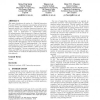Free Online Productivity Tools
i2Speak
i2Symbol
i2OCR
iTex2Img
iWeb2Print
iWeb2Shot
i2Type
iPdf2Split
iPdf2Merge
i2Bopomofo
i2Arabic
i2Style
i2Image
i2PDF
iLatex2Rtf
Sci2ools
130
click to vote
CASES
2000
ACM
2000
ACM
Flexible instruction processors
This paper introduces the notion of a Flexible Instruction Processor (FIP) for systematic customisation of instruction processor design and implementation. The features of our approach include: (a) a modular framework based on "processor templates" that capture various instruction processor styles, such as stack-based or register-based styles; (b) enhancements of this framework to improve functionality and performance, such as hybrid processor templates and superscalar operation; (c) compilation strategies involving standard compilers and FIP-specific compilers, and the associated design flow; (d) technology-independent and technology-specific optimisations, such as techniques for efficient resource sharing in FPGA implementations. Our current implementation of the FIP framework is based on a highlevel parallel language called Handel-C, which can be compiled into hardware. Various customised Java Virtual Machines and MIPS style processors have been developed using existing F...
CASES 2000 | Instruction Processor Design | Instruction Processors | Processor Templates | System Software |
Related Content
| Added | 24 Aug 2010 |
| Updated | 24 Aug 2010 |
| Type | Conference |
| Year | 2000 |
| Where | CASES |
| Authors | Shay Ping Seng, Wayne Luk, Peter Y. K. Cheung |
Comments (0)

